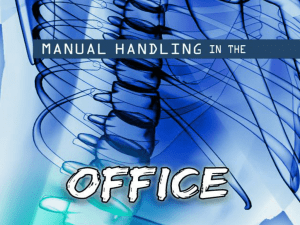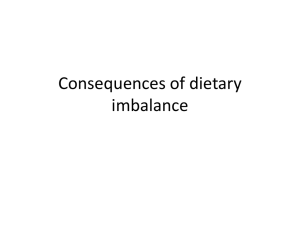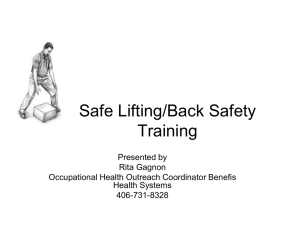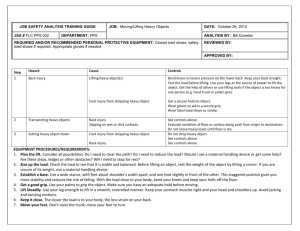William Charney
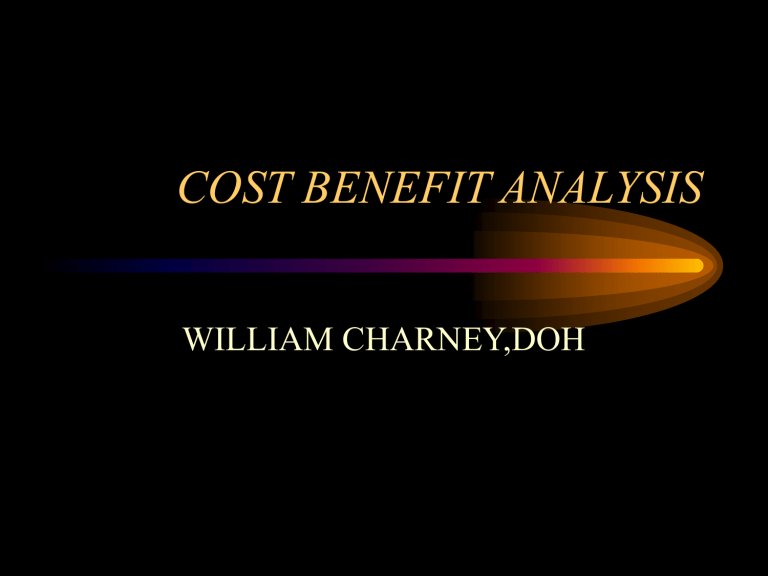
COST BENEFIT ANALYSIS
WILLIAM CHARNEY,DOH
Politics of Cost Benefit
•
Money is politics, politics is money in healthcare. Cost Benefit is political.
•
Being right and cost-justified does not always lead to program funding.
•
US is 27th on the list for providing per capita occupational safety for its workers @
$3.97 per worker.
Understanding the Politics of
Cost-Benefit
•
Budgeting for occupational programs should be an ethical issue not economic.
•
Every hospital has an Ethics Committee.
Get on the agenda
•
Alliances with labor
•
Struggle for $ on Health and Safety
Committee
ADDING THE COST OF
INJURY
•
MOST COST BENEFIT ANALYSIS DOES
NOT PROPERLY INCLUDE THE COSTS
OF THE EMPLOYEE INJURY. WITHOUT
THE COST OF THE INJURY
RATIONALIZING EXPENDITURES AND
BENEFITS IS IMPOSSIBLE.
The Science of Cost Benefit
•
Cost Benefit Analysis is a science that must be understood before true injury costs can be determined and understood
•
It is extremely rare that leaders of our healthcare systems understand or have studied the science of cost-benefit analysis regarding injury rates
OPENING OF FINANCIAL
DOORS
•
COST BENEFIT ANALYSIS(CBA) IS
THE KEY TO OPENING THE
FINANCIAL DOORS TO PURCHASE
AND PROGRAM JUSTIFICATION.
TOTAL COSTS INCLUDES:
•
DIRECT COSTS
•
INDIRECT COSTS
DIRECT COSTS
•
DIRECT COSTS ARE CONSIDERED
THE FOLLOWING:
•
DIRECT COMPENSATION FOR
REPORTED LOST TIME INCIDENTS
•
MEDICAL COSTS
•
INCREASE IN WORKERS COMP
PREMIUMS
INDIRECT COSTS
•
INDIRECT COSTS ARE CONSIDERED:
•
LOST WORKDAYS(WAGES X HOURS
LOST)
•
LOST TIME FOR MANAGERS AND
REDUCED PRODUCTIVITY DUE TO
INJURY
•
21% DECREASE IN WORKER
PRODUCTIVITY
INDIRECT COSTS CONT.
•
OVERTIME PAID TO OTHERS DURING
LOST WORKDAYS
•
PERSONNEL AND TRAINING TIME TO
HIRE REPLACEMENTS
•
COST OF EMERGENCY TREATMENT
•
COST FOR LIGHT DUTY
•
RECRUITING COSTS/CLAIM PROCESS
APPLICATIONS
•
INTERGRATING THE DIRECT COST OF
THE INJURY INTO THE ANALYSIS
•
INTERGRATING THE INDIRECT COST
•
ANALYZING THE COST OF
EQUIPMENT
•
ANALYZING TRAINING COST
•
ANALYZING DEPRECIATION COST
INDIRECT COST SIMPLE
METHOD
•
INDIRECT COST COMPUTATION IS
CONSIDERED 4X THE DIRECT COST
• (SOURCE:Fragala, “How to contain injury in healthcare: Ergonomics, 1966.
Charney,Cost benefit analysis for back injury. Journal of Healthcare Safety and
Infection Control; Dec. 2000.
Archives of Internal Medicine
•
Peer review article states indirect costs to be a factor of 2x
•
Source: Archives of Internal Medicine,
“Occupational injury in the US: July 28th,
1997 pp1557-1568
Formula Using Profit Ratios
•
Estimated Cost Savings Divided by Profit
Ratio = Dollars Not Having to be Billed
•
Ex: Hospital Spends 170,000 on Lift Teams or Equipment calculates a savings in one year of WC of $54,000 divided by 2.8% profit ratio equals 2 million dollars not having to be billed to cover injuries.
Cost Benefit for Back Injury
•
Back injury is one of the highest compensable injuries in healthcare
BUREAU OF LABOR STATISTICS
•
THE BUREAU OF LABOR STATISTICS
NOW C LASSIFIES HEALTH CARE
PATIENTS AS DIRECT CAUSE OF ON
THE JOB INJURY
CAUSES OF INJURY
•
MANUAL LIFTING IS THE PRIMARY
CAUSE OF BACK INJURY IN
HEALTHCARE WORKERS. THE NINE
MOST COMMON MANUAL LIFTS
EXCEED THE NIOSH UPPER LIMITS
FOR LIFTING AND MOST ENTER THE
MICROFRACTURE RANGE OF 6400NF
FORMUALAS FOR
CALCULATION
•
BUSINESS PLAN CALCULATIONS
REQUIRE;
•
DIRECT COST OF INJURY(COMP AND
MEDICAL)
•
MULTIPLY BY FACTOR OF 4X
•
COST OF EQUIPMENT
•
COST OF TRAINING
COST BENEFIT ANALYSIS FOR
0 LIFT
•
O LIFT HAS 2 TECHNOLOGIES: LIFT
TEAMS AND O LIFT REPLACING
MANUAL LIFTING WITH
MECANIZATION. PREPARING THE
COST BENEFIT IS CENTRAL TO
GETTING THE FUNDING
•
MECANICAL EQUIPMENT IS
MANDATORY FOR SUCCESS : TWO
STUDIES HAVE SHOWN THAT COST
FOR EQUIPMENT IS PAID FOR WITHIN
12-15 MONTHS OF PURCHASE.
•
(Source: Garg and Charney)
FORMULAS FOR
CALULALTION
•
2 FORMULAS FOR CALCULATION OF
EQUIPMENT
•
1 VERTICAL, LATERAL AND SIT TO
STAND DEVICE PER MEDICAL WARD
•
I VERTICAL, LATERAL AND SIT TO
STAND FOR EVERY 8-15 PATIENTS
•
ONE LATERAL TRANSFER
STRETCHER PER ER TRAUMA ROOM
Garg Equipment Formula Ratio
•
Based on number of patients needed to be transferred: 2 total lifts per 17-24 patients and 3 total lifts for 33 to 50 patients
•
Sit to Stand: 6 sit to stand 42-50 patients
•
Re-positioning Equip: 10 devices 42-50 patients
DEPRECIATION COST
FORMULA
•
MECHANICAL EQUIPMENT LIFE
EXPECTANCY IS 7-10 YEARS IF
PROPERLY MAINTAINED.
•
SOFT PARTS NEED REPLACING MORE
FREQUENTLY(MATTRESSES, SLINGS
ETC.
Some success studies
•
OSHA cited over 50+ studies showing a positive cost benefit for “0” Lift
•
Texas Hospital: Fragala: Added Lift equipment WCB costs reduced from
$111,159 to $743
•
Garg: 7 Nursing Home Study: Injury rates reduced by 62%
Studies (cont)
•
Surrey Memorial:Bruening 1996: no lift policy reduced injuries by 96%
•
Lawrence Memorial: Fragala: Lift aids on 2 high risk units: Lost time hours dropped
43%
•
Charney: 60 bed Tampa Nursing Home: No lift, ceiling lifts: Lost time dropped to 0
British Colombia Study
•
A one year study replacing floor lifts with ceiling lifts showed a payback period of 4 years.
•
Payback period shorter when indirect costs included
•
Perspective of facility itself, benefits exceeded costs by 6 to 1 or a rate of return of 17.9%25
British Colombia Study (cont)
•
65 ceiling lifts installed
• reduced injury rates by 58% within 1 year
•
Patient Lifting injury costs pre $83,000
•
Patient Lifting injury costs post $27,000
• re-positioning pre $113,000
• re-positioning post $65,000
•
Payback 3.9 years
•
Benefit cost ratio 2.53
•
Internal rate of return 8.1%
•
Source: Speigel, et al Implementing a resident lifting system: AAOHN vol 50, no.3 March 2002
CBA in Needlesticks
•
Adding the cost of the stick to the mathematics of Cost-benefit makes safety devices cheaper than non-safety
•
GAO calculates that a low post-exposure cost is $500 per stick, a moderate is $1500 per stick and a high is $3000 per stick.
CBA in Latex Exposure
•
Peer review studies show that going to a non-latex facility is cheaper than paying for the costs of maintaining a latex environment.
JUSTIFICATION RATIOS
•
SOME HOSPITALS AND LTC
FACILITIES WILL HAVE HIGHER
JUSTIFICATION RATIOS THAN
OTHERS. THE PROGRAM IS BASED AS
MUCH UPON RISK PREVENTION AS
COST. ONE PERMANENT DISABILITY
CAN COST A SYSTEM OVER $100,000.
BARRIERS TO SUCCESS
•
WORKERS COMP COSTS IN MOST
SYSTEMS IS ONLY 1% OR LESS THAN
TOTAL OPERATING COST BUDGET.
•
DEPARTMENTAL AND SYSTEM COSTS
FOR BACK INJURY CAN BE WELL
HIDDEN AND INSULATED
• “HIGHER PRIORTIES” MYTHS
•
CEOS,CFOS NOT TRAINED IN CBA
ROADS TO SUCCESS
•
MANY STUDIES NOW SHOWING
GREAT CBA BENEFITS.
•
SOME STATES HAVE ERGO
LEGISLATION.
Calculating the costs:OSHA
•
Each prevented injury or illness resulting in time away form work saves $28,000
• each serious injury or illness avoided saves
$7000
•
Source: OSHA e-compliance assistance tools
Studies on indirect costs
•
Peer review studies on the 1:1 all the way to
10:1 ratio of indirect costs to direct costs.
•
Source: Charney, Journal of Healthcare
Safety and Infection Control; vol 3 no2 and
Fragala...
CONCLUSION
•
EVERYWHERE PEER REVIEW
SCIENCE LOOKS THERE IS A
POSITIVE(+) COST BENEFIT ANALYSIS
TO IMPLEMENTING SAFETY
PROGRAMS IN HEALTHCARE
